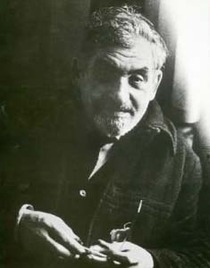 Found among some papers at Jot HQ, three photocopied pages of a panegyric by poet William Oxley to his better known poet and friend Hugo Manning (1913 – 77). Entitled ‘ The Scapegoat and the Muse ‘ it lavishes praise on a man who appears to have been a larger than life character in the mould perhaps of his friend Dylan Thomas, who was his junior by a few months and from whose work he drew inspiration. But Manning, in Oxley’s eyes, seems to have been an amalgam of so many attributes:
Found among some papers at Jot HQ, three photocopied pages of a panegyric by poet William Oxley to his better known poet and friend Hugo Manning (1913 – 77). Entitled ‘ The Scapegoat and the Muse ‘ it lavishes praise on a man who appears to have been a larger than life character in the mould perhaps of his friend Dylan Thomas, who was his junior by a few months and from whose work he drew inspiration. But Manning, in Oxley’s eyes, seems to have been an amalgam of so many attributes:
‘Hugo Manning restless traveller of the world and of the imagination’s ‘realms of gold’; Hugo Manning journalist-clerk and Reuter’s hack, Hugo Manning massively simple man sick with an old-fashioned integrity; Hugo Manning homo sapiens with burnt up-soul sacrificed on what unknown altars of pleasure; Hugo Manning late—ah-all too late –poetic developer…Hugo Manning last of the true troubadours…Hugo Manning mind, soul and things flesh caught at the cross roads and in what crosswinds of Judean-Christian-Hellenic cultures…’
Hugo Manning is one of those characters who flits in and out of memoirs of the forties and early fifties. Looking back at his own career as editor of the literary magazine Littack in the early seventies Oxley recalls his first meeting with him at a friend’s home: ‘ lo there appeared Hugo’s grand, huge-headed black-bearded form smoking out a pipely-cloud like a Moses –god’. In Derek Stanford’s wonderfully entertaining Inside the Forties (1977) Manning appears as a physically ‘massive ‘ figure with a reputation as ‘a species of guru’ who, despite being Jewish, became an unlikely admirer of the anti-semitic Roy Campbell. Oxley quotes Manning himself on Campbell: ‘By all that was right, natural, I should have hated Campbell—I being a Spanish Republican sympathiser, he a Catholic fascist. But I found whenever I met Campbell, he was so overwhelmingly, genuinely human. I have not met another like him—so full of a humane and human quality.’
According to the five-line ‘biography’ submitted to Howard Sergeant, editor of the 1946 Fortune press anthology, For Those who are Alive, Manning had published ‘several books of poetry and a novelette’ by this date. Abebooks records at least three of these—Smile, Ichabod (1944), which was privately printed by the Curwen Press, Dead Season’s Heritage (1942) and Storm Over Eskwallidy (1942)—the last two having been published in Buenos Aires where Manning worked as a journalist and where he came to know Borges. He seems to have been far more prolific in the nineteen seventies.
Perhaps we should leave the final word to Oxley:
‘… there are no just parallels, no equivalences to Hugo and how he was with me and how I find him . The dark flavour of the man was unique…’
R.M.Healey

There’s a biography of Manning by Ivan Savidge, with a preface by Frederic Forsyth – another unlikely connexion. Manning had a very badly broken leg after a car crash which left him in permanent pain and limited his mobility.